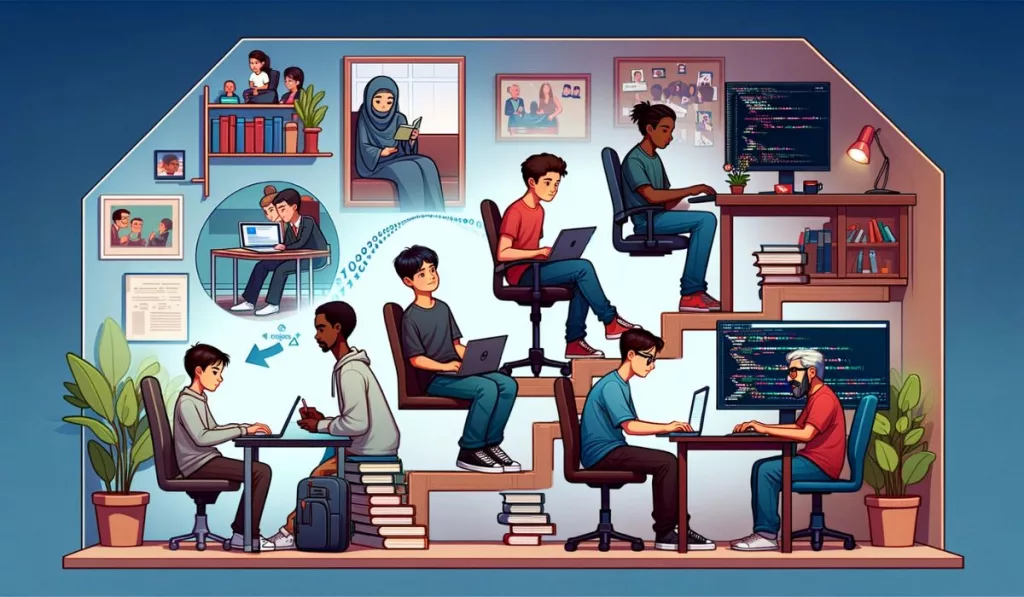Becoming a coder in today’s digital era is a pathway to a plethora of opportunities. As technology becomes increasingly integral in various industries, mastering the art of coding is not just about coding but understanding and solving complex problems. The demand for skilled coders is skyrocketing, making it a lucrative and rewarding career choice.

- Understanding Basics
- Education & Training
- Building a Portfolio
- Internships & Networking
- Problem-Solving Skills
- Resources & Tools
- Soft Skills
- Specialization
- Job Search
- Freelancing Opportunities
- Challenges & Persistence
- FAQ’s
- What skills are essential to become a programmer?
- How do I choose the right programming language to start with?
- Are certifications necessary to get a programming job?
- What is the significance of building a portfolio in programming?
- How do I stay updated with the latest trends in programming?
- Is it challenging to transition into programming from a different career field?
Understanding Basics
To embark on your journey as a coder, it’s essential to grasp the fundamentals. Coding is more than just writing code; it’s about problem-solving and creating innovative solutions using technology.
If you’re wondering how to become a programmer, it’s essential to start by learning programming languages, understanding algorithms, and practicing problem-solving techniques consistently.
Choosing a Programming Language
The programming world is rich with languages like Python, Java, and JavaScript, each with its unique strengths. Your choice should align with your goals and interests. Whether you’re drawn to web development, data science, or another field, the right language can set the foundation for your success.
Also read: Top 10 Programming Languages for Blockchain App Development
Education & Training
Deciding between formal education and self-learning is a critical step. While degrees offer a structured learning environment and often a broader theoretical background, self-learning through online platforms can provide more flexibility and focus on specific skills.
Online Learning Platforms
Platforms like Udemy and Coursera have revolutionized learning, making it accessible and diverse. These platforms range from beginner to advanced courses, covering everything from basic programming concepts to intricate, specialized fields.
Also read: What is the future of programming?
Building a Portfolio
A coder’s portfolio is a testament to their skills and creativity. Engage in personal projects or contribute to open-source projects to demonstrate your abilities to potential employers. A well-crafted portfolio can be a key differentiator in the job market.
Internships & Networking
Real-world experience is invaluable. Internships offer a glimpse into the professional world, while networking with industry professionals can open up numerous opportunities and provide insights that you can’t find in textbooks.
Problem-Solving Skills
At the heart of programming is the ability to solve problems analytically. Developing and honing these skills is crucial for navigating and overcoming the complexities of coding.
Resources & Tools
Maximize your productivity and efficiency by utilizing tools like Integrated Development Environments (IDEs), version control systems like Git, and various libraries that can streamline your coding projects.
Soft Skills
Technical prowess isn’t everything. Effective communication and teamwork are essential in a collaborative environment. Working well in a team can enhance project outcomes and your personal growth as a coder.
Specialization
As you progress, consider specializing in a particular area like web development, artificial intelligence, or cybersecurity. Specialization allows for deeper skill development and expertise in specific domains, making you a valuable asset in that field.
Job Search
When you’re ready to enter the job market, focus on crafting a compelling resume and mastering interview techniques. These are key to landing your dream programming job.
Freelancing Opportunities
For those who prefer a more independent career path, platforms like Upwork and Fiverr offer freelancing opportunities. Building a reputable profile and delivering high-quality work can pave the way for a successful freelancing career.
Also read: Factors that Affect the Cost of a Source Code Audit or Code Review
Challenges & Persistence
The path to becoming a successful coder is filled with challenges. Perseverance is essential. Embrace these challenges as learning opportunities and use them to fuel your growth and development.
Conclusion
Becoming a coder is a journey of dedication, continuous learning, and adaptability. Embrace this journey, leverage the available resources, and persist through the challenges to excel in this dynamic and ever-evolving field.
FAQ’s
What skills are essential to become a programmer?
Essential skills for a programmer include problem-solving abilities, logical thinking, attention to detail, proficiency in a programming language or languages, understanding of algorithms and data structures, good communication skills, and the ability to work in a team.
How do I choose the right programming language to start with?
The choice of programming language often depends on your goals, interests, and the specific area of programming you want to pursue. For beginners, languages like Python, JavaScript, or Java are popular due to their readability, versatility, and wide application across various domains.
Are certifications necessary to get a programming job?
Certifications can enhance your resume and showcase your expertise, but they are not always mandatory. Practical skills, experience, and a strong portfolio often weigh more heavily in the hiring process. However, certain specialized fields or companies may value specific certifications.
What is the significance of building a portfolio in programming?
A portfolio showcases your practical skills, projects, and contributions, allowing potential employers to gauge your capabilities. It demonstrates real-world application of your programming knowledge, making you more attractive to employers or clients.
How do I stay updated with the latest trends in programming?
To stay updated, engage in continuous learning through online resources, forums, and blogs, attend conferences, join coding communities, follow industry influencers, and explore new technologies. Subscribing to newsletters or podcasts dedicated to programming updates is also beneficial.
Is it challenging to transition into programming from a different career field?
Transitioning into programming from a different field can be challenging but feasible. It requires dedication, learning new skills, and possibly gaining relevant certifications or a degree in programming. Leveraging transferable skills from your previous career, such as problem-solving or analytical thinking, can aid in the transition.










Leave a Reply